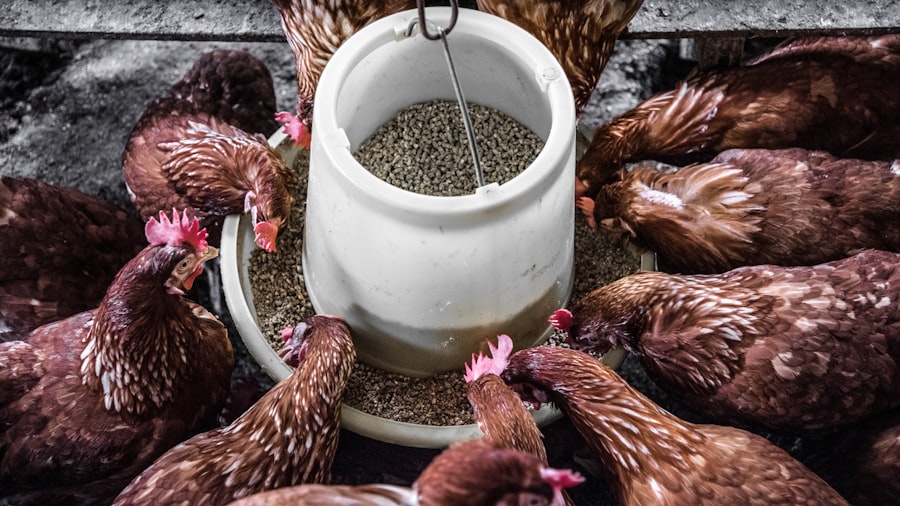Raising chickens in an urban garden has become increasingly popular in recent years, and for good reason. Not only do chickens provide a sustainable source of fresh eggs and meat, but they also offer a variety of other benefits for urban gardeners. One of the most obvious benefits is the access to fresh eggs. There is nothing quite like collecting eggs from your own backyard and enjoying them for breakfast. In addition to eggs, chickens can also provide a source of meat for those who are interested in raising their own food.
Another benefit of raising chickens in an urban garden is the fertilizer they produce. Chicken manure is rich in nutrients and can be used to fertilize your garden, helping your plants grow strong and healthy. This eliminates the need for chemical fertilizers and reduces your carbon footprint. Additionally, chickens can help control pests in your garden by eating insects and other small creatures that may damage your plants.
Key Takeaways
- Raising chickens in an urban garden can provide numerous benefits, including fresh eggs, meat, and natural pest control.
- Before keeping chickens, it’s important to research local laws and regulations to ensure it’s legal in your area.
- Choosing the right chicken coop involves considering size, style, and materials to ensure the safety and comfort of your birds.
- Building your own chicken coop requires careful planning and gathering of materials, but can be a cost-effective option.
- Feeding and caring for your chickens involves providing proper nutrition, maintaining their health and hygiene, and choosing the right breeds for your needs.
Legal Considerations: Can You Keep Chickens in Your Area?
Before you start raising chickens in your urban garden, it is important to research the local laws and regulations regarding keeping chickens in your area. Many cities have specific rules about the number of chickens you can keep, the size and style of the coop, and the distance the coop must be from neighboring properties. It is important to follow these laws and regulations to avoid fines or other legal consequences.
In addition to legal considerations, it is also important to consider the impact that keeping chickens may have on your neighbors. Some people may be allergic to chickens or have concerns about noise or odor. It is important to be respectful of your neighbors and address any concerns they may have. This may involve keeping a smaller number of chickens, using odor control measures, or providing additional privacy screening around the coop.
Choosing the Right Chicken Coop: Size, Style, and Materials
Choosing the right chicken coop is essential for the health and well-being of your chickens. The coop should provide enough space for the chickens to move around comfortably and should be designed to protect them from predators. When choosing a coop, consider the number of chickens you plan to keep and the amount of space you have available in your urban garden.
There are many different styles of chicken coops to choose from, including traditional wooden coops, mobile coops, and even repurposed structures such as sheds or playhouses. Consider the style that best fits your garden aesthetic and meets the needs of your chickens.
When it comes to materials, it is important to choose materials that are durable and easy to clean. Wood is a popular choice for chicken coops because it is sturdy and provides good insulation. However, it is important to use untreated wood to avoid exposing your chickens to harmful chemicals. Other materials such as metal or plastic can also be used, but they may not provide the same level of insulation as wood.
Building Your Own Chicken Coop: Designing a Plan and Gathering Materials
If you are handy with tools and enjoy do-it-yourself projects, building your own chicken coop can be a rewarding experience. Before you start building, it is important to design a plan that includes all the necessary features for a functional and comfortable coop. This may include nesting boxes, roosting bars, ventilation, and access doors.
Once you have a plan in place, gather all the necessary materials. This may include lumber, hardware, wire mesh, roofing materials, and paint or stain. It is important to choose high-quality materials that will withstand the elements and provide a safe environment for your chickens.
When building your own chicken coop, it is important to take your time and follow the plan carefully. Make sure all joints are secure and all edges are smooth to prevent injury to your chickens. It may also be helpful to have a friend or family member assist you with the construction process.
Preparing Your Garden for Chickens: Fencing, Landscaping, and Safety Measures
Before bringing chickens into your urban garden, it is important to prepare the space to ensure their safety and the protection of your plants. One of the first steps is to install a secure fence around the perimeter of your garden. This will help keep predators out and prevent your chickens from wandering into neighboring yards.
In addition to fencing, it is important to consider the landscaping of your garden. Chickens can be destructive to plants, so it is important to create designated areas for them to roam and forage. This may include creating a separate chicken run or using temporary fencing to section off areas of your garden.
Safety measures are also important when it comes to keeping chickens in an urban garden. Make sure all gates and doors are secure and that there are no gaps or holes in the fence where predators could enter. It is also important to provide shade and shelter for your chickens, especially during extreme weather conditions.
Feeding and Caring for Your Chickens: Nutrition, Health, and Hygiene

Feeding and caring for your chickens is an important part of keeping them healthy and productive. Chickens require a balanced diet that includes a combination of grains, protein, fruits, vegetables, and calcium. There are many commercially available chicken feeds on the market that provide all the necessary nutrients, or you can choose to create your own feed mix.
In addition to a balanced diet, chickens also require access to fresh water at all times. Make sure to provide clean water in a container that is large enough for all your chickens to drink from comfortably.
Regular health checks are also important for keeping your chickens in good condition. Check their feathers, eyes, beaks, and feet regularly for any signs of illness or injury. It is also important to keep their living area clean and free from waste to prevent the spread of disease.
Choosing the Right Breeds: Egg Laying, Meat Production, and Temperament
When choosing the right chicken breeds for your urban garden, there are several factors to consider. One of the most important factors is egg laying. If you are primarily interested in fresh eggs, choose breeds that are known for their high egg production. Some popular egg-laying breeds include Rhode Island Reds, Leghorns, and Australorps.
If you are interested in raising chickens for meat, there are specific meat breeds that are known for their fast growth and high meat yield. Some popular meat breeds include Cornish Cross, Freedom Rangers, and Jersey Giants.
Temperament is another important factor to consider when choosing chicken breeds. Some breeds are more docile and friendly, while others may be more skittish or aggressive. Consider your own comfort level with handling chickens and choose breeds that match your personality and preferences.
Integrating Chickens into Your Garden: Soil Health, Pest Control, and Fertilization
One of the greatest benefits of raising chickens in an urban garden is their ability to contribute to soil health and pest control. Chickens naturally scratch and peck at the ground, which helps to aerate the soil and control pests such as slugs, snails, and insects.
To maximize the benefits of integrating chickens into your garden, consider using a rotational grazing system. This involves moving your chickens to different areas of your garden on a regular basis to allow them to forage and fertilize different sections. This can help improve soil fertility and reduce the need for chemical fertilizers.
It is also important to provide your chickens with access to fresh grass and vegetation. This can be done by allowing them to free-range in designated areas of your garden or by providing them with a movable chicken tractor that can be placed in different areas of your garden.
Harvesting and Using Chicken Products: Eggs, Meat, and Manure
Once your chickens start laying eggs, it is important to harvest them regularly to ensure their freshness. Collect eggs daily and store them in a cool, dry place until you are ready to use them. Fresh eggs can be used in a variety of recipes or enjoyed on their own.
If you are raising chickens for meat, it is important to humanely slaughter and process them when they reach the appropriate age and size. This can be done at home or by taking them to a local butcher. The meat can then be used in a variety of recipes or preserved for later use.
Chicken manure is a valuable resource for gardeners and can be used as a natural fertilizer for your plants. It is important to compost the manure before using it in your garden to reduce the risk of spreading pathogens. Composted chicken manure can be spread on your garden beds or added to your compost pile to help improve soil fertility.
The Rewards of Keeping Chickens in Your Urban Garden
Raising chickens in an urban garden can be a rewarding and fulfilling experience. Not only do chickens provide a sustainable source of fresh eggs and meat, but they also offer a variety of other benefits such as pest control, soil health, and fertilizer production. By following local laws and regulations, choosing the right chicken coop, and providing proper care and nutrition, you can enjoy all the benefits that chickens have to offer in your own urban garden. So why not consider raising chickens in your own backyard? You may be surprised at how much joy and satisfaction they can bring.
If you’re considering keeping chickens in your urban garden, you may be wondering about the best coop options available. Look no further than Poultry Wizard’s comprehensive guide on chicken coops. One article that caught our attention is their review of the “Rent-a-Chicken Coop” program, which offers a convenient and affordable solution for urban dwellers who want to experience the joys of raising chickens without the long-term commitment. To learn more about this innovative coop rental service, check out Poultry Wizard’s article here. Additionally, if you’re looking for a high-quality coop to purchase, Poultry Wizard also provides a detailed review of the “Producers Pride Sentinel Chicken Coop” here. And for those with larger flocks, their article on the “Chicken Coop 10” here offers valuable insights into a spacious and durable coop option.
FAQs
Can I keep chickens in my urban garden?
Yes, you can keep chickens in your urban garden, but it depends on the local laws and regulations in your area. Some cities allow backyard chickens, while others do not.
What are the benefits of keeping chickens in an urban garden?
Keeping chickens in an urban garden can provide fresh eggs, natural pest control, and fertilizer for your garden. Chickens also make great pets and can be a fun addition to your backyard.
What do I need to consider before keeping chickens in my urban garden?
Before keeping chickens in your urban garden, you need to consider the space available, the local laws and regulations, and the time and effort required to care for the chickens. You also need to ensure that your neighbors are okay with the idea of having chickens nearby.
What kind of coop do I need for my urban garden chickens?
You will need a secure and predator-proof coop for your urban garden chickens. The coop should be large enough to accommodate the number of chickens you plan to keep and should have nesting boxes for the chickens to lay their eggs.
What do urban garden chickens eat?
Urban garden chickens eat a variety of foods, including chicken feed, grains, fruits, vegetables, and insects. It is important to provide a balanced diet for your chickens to ensure their health and well-being.
How do I care for my urban garden chickens?
Caring for urban garden chickens involves providing them with food and water, cleaning their coop regularly, and ensuring that they are healthy and free from disease. You may also need to provide them with supplements and medications as needed.
Meet Walter, the feathered-friend fanatic of Florida! Nestled in the sunshine state, Walter struts through life with his feathered companions, clucking his way to happiness. With a coop that’s fancier than a five-star hotel, he’s the Don Juan of the chicken world. When he’s not teaching his hens to do the cha-cha, you’ll find him in a heated debate with his prized rooster, Sir Clucks-a-Lot. Walter’s poultry passion is no yolk; he’s the sunny-side-up guy you never knew you needed in your flock of friends!







